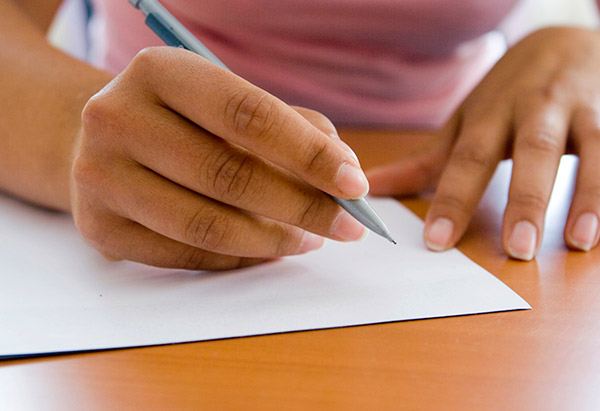6 (Easy!) Ways Anyone Can Become a Writer
In Natalie Goldberg's new book, The True Secret of Writing (Atria), she observes that "to write is to be empowered.... Writing is not just for someone who wants to write the great American novel." Here's how to get started.

Photo: Thinkstock.com
Step 1: Buy a fast pen and cheap notebook
You should know how to write with pen and paper and not just on the computer, which is a whole other process. The pen should be fast enough to keep up with your mind, and the notebook shouldn't be precious. You'll be writing a lot of junk in it before the good stuff.
Step 2: Leave the house
When you're in the house, the phone rings, the dishes need washing—there are a million excuses to do this or that instead of write. Go out! I prefer less-frequented cafés where the food isn't very good so I can stay at the same table for a long time. Leave a big tip!
Step 3: Get some friends to write with
Writing partners keep you honest. Decide you'll each write for 20 minutes to start. Grab any topic and just move that pen. If you find yourself stuck, seeing the person across from you still scribbling away will inspire you to get past it.
Step 4: Shut up and write
Forget all the rules, such as "Write what you know." Once you get going, what else is there anyway? The essential thing is to begin. Don't talk about it. Don't get a lovely studio or a beautiful desk. Just do it.
Step 5: Practice silence
Behind writing, behind words, is no words. We need to know about that place. It gives us a larger perspective from which to handle language. Silence can be the door to listening, which is one of the great cornerstones to writing.
Step 6: Reading is everything
Sometimes my students come to me and tell me they don't read. Why should someone read you if you're not reading anybody else? Writers are your real teachers. When you read a book, you're studying the mind of the author. Reading exercises and develops the mind.
More Ways to Improve Your Writing
You should know how to write with pen and paper and not just on the computer, which is a whole other process. The pen should be fast enough to keep up with your mind, and the notebook shouldn't be precious. You'll be writing a lot of junk in it before the good stuff.
Step 2: Leave the house
When you're in the house, the phone rings, the dishes need washing—there are a million excuses to do this or that instead of write. Go out! I prefer less-frequented cafés where the food isn't very good so I can stay at the same table for a long time. Leave a big tip!
Step 3: Get some friends to write with
Writing partners keep you honest. Decide you'll each write for 20 minutes to start. Grab any topic and just move that pen. If you find yourself stuck, seeing the person across from you still scribbling away will inspire you to get past it.
Step 4: Shut up and write
Forget all the rules, such as "Write what you know." Once you get going, what else is there anyway? The essential thing is to begin. Don't talk about it. Don't get a lovely studio or a beautiful desk. Just do it.
Step 5: Practice silence
Behind writing, behind words, is no words. We need to know about that place. It gives us a larger perspective from which to handle language. Silence can be the door to listening, which is one of the great cornerstones to writing.
Step 6: Reading is everything
Sometimes my students come to me and tell me they don't read. Why should someone read you if you're not reading anybody else? Writers are your real teachers. When you read a book, you're studying the mind of the author. Reading exercises and develops the mind.
More Ways to Improve Your Writing



